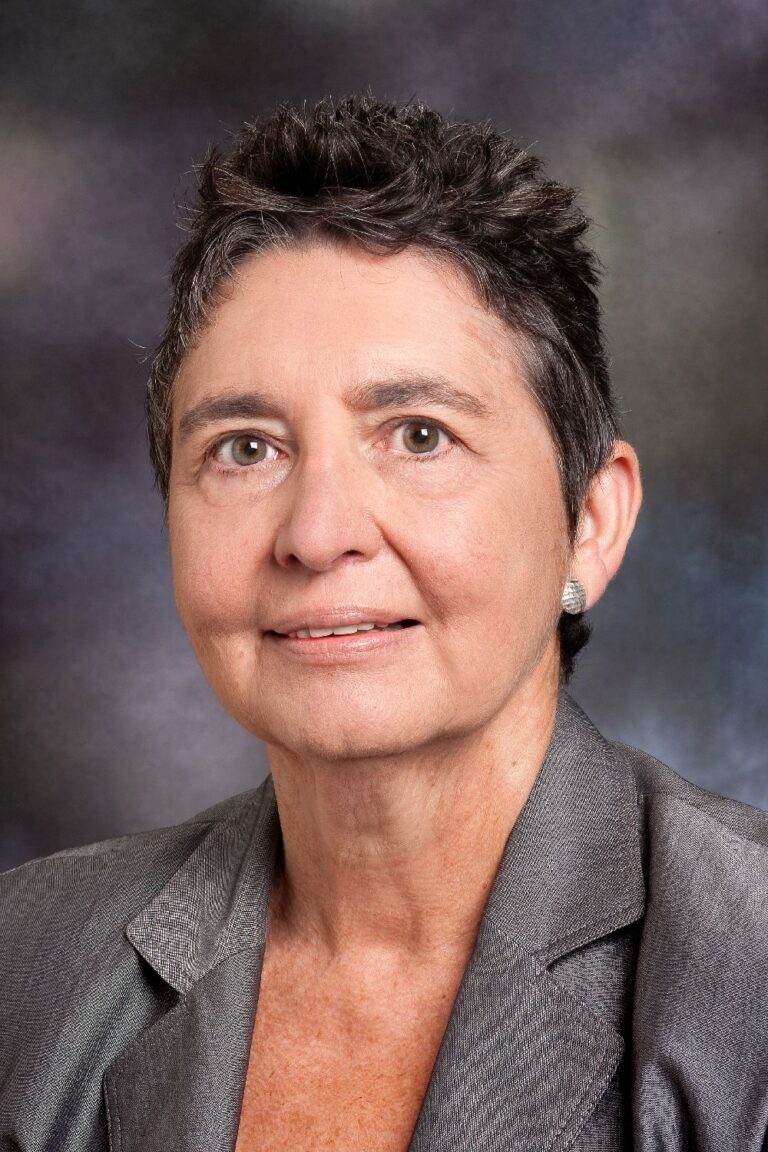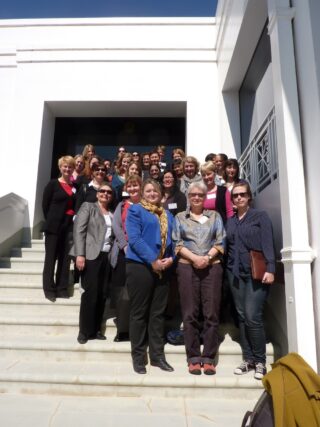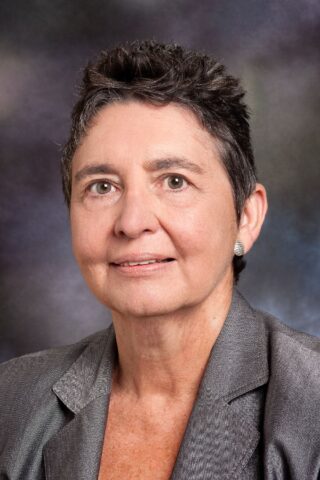- Entry type: Person
- Entry ID: AWE4903
Sawer, Marian
- Birth name Goodwin, Marian

- Born 20 August 1946, Auckland, , New Zealand
- Occupation Academic, Political scientist, Public servant
Summary
As an early-career academic, Marian Sawer experienced first-hand the difficulties encountered by women in a male-dominated workplace. After establishing equal employment opportunity programs at the Australian National University and the Department of Foreign Affairs in the 1980s, she pursued an academic career as a political scientist at the University of Canberra and the Australian National University, becoming head of the Political Science Program in the Research School of Social Sciences at the Australian National University in 2000 and being promoted to professor in 2003. From 2002 to 2008 she led the Democratic Audit of Australia which assessed the health of Australian democracy and produced over 200 discussion papers and reports. Marian took a leading role in Women’s Electoral Lobby campaigns in the 1980s and 1990s, particularly around equal opportunity legislation, women’s policy machinery and tax reform. She has authored or edited around twenty books, including a history of the Women’s Electoral Lobby.
Details
Marian Sawer was born in New Zealand but moved to Australia for her secondary schooling. She studied at the Australian National University being awarded a Bachelor of Arts (Honours) degree in 1968, a Master of Arts degree in 1970 and a Doctor of Philosophy degree in 1975.
Marian was awarded an Australian National University postdoctoral travelling fellowship on completion of her doctorate, although two small children made overseas travel somewhat difficult. In general the 1970s posed difficult problems in combining career and family (three daughters by the end of the decade). Such issues received little formal recognition in Australian universities at a time when the absence of married women from academic positions was regarded as normal. For Marian there were the stresses of commuting to Adelaide for a postdoctoral fellowship, to Sydney for a short-term lectureship and cutting short visiting fellowships at Stanford and Columbia Universities.
In 1979 Marian surveyed the status of women in political science departments around Australia, finding that the most common pattern was for there to be one woman on the academic staff and that a common attitude was ‘why would one need more?’ In that year she co-founded with Carole Pateman the Women’s Caucus of the Australasian Political Studies Association. She has continued to play an active role in the research and policy role of the Women’s Caucus from this time and was responsible for initiating the Women and Politics Prize in 1981. She was also actively involved in the establishment of other professional bodies such as WISENET (Women in Science Enquiry Network), of which she was made a life member.
By 1983 when she became full-time Equal Employment Opportunity consultant to the Australian National University Marian had accumulated a wealth of first-hand experience as well as knowledge of the barriers to equal opportunity for women in academic employment. She was also able to build on an earlier report by Gwenda Bramley and Marion Ward, commissioned by the ANU in International Women’s Year. Her own report could be more forthright, with federal legislation on its way to require universities to remove barriers for women. She also helped establish an association of women employees to provide a political base for the report’s recommendations. There was still strong resistance to ideas, for example, that there should be career structures for women in keyboard positions or formal selection criteria for positions in the research wing of the university. Too often there had been a pattern of homosocial reproduction that resulted in women holding only six of the tenured research positions in the whole university at the time of Marian’s report.
Marian took her ANU experience with her to the Department of Foreign Affairs, where she developed another path-breaking equal opportunity program in 1985. Her edited book of that year, Program for Change, was intended to allay some of the fears surrounding equal opportunity both in universities and public sector employment. It was launched by newly appointed Commonwealth Sex Discrimination Commissioner Pam O’Neil. Reflecting the policy relevance of her books, many have been launched by Ministers, including Senator Susan Ryan, Carmen Lawrence MP, Prime Minister Paul Keating and former Minister Peter Baume. But she was also receiving recognition for her academic and professional contribution and in 1985 became President of the Australasian Political Studies Association.
In the latter part of the 1980s Marian combined work in Foreign Affairs and the Office of the Status of Women in the Department of Prime Minister and Cabinet with a senior research fellowship in the social justice project headed by Pat Troy at the ANU. This enabled her to reflect on the meaning of the feminist institution-building that had been taking place in Australian government, exemplified by the wheel model of women’s policy machinery and the women’s budget process for which she had responsibility in the Foreign Affairs portfolio. Her pioneering book Sisters in Suits provided empirical information about what had been happening in Australia as feminists engaged with the state. It was a revelation for many and became a building block for international theory and practice regarding ‘state feminism’.
Outside her work as public servant and academic, Marian took a leading role in Women’s Electoral Lobby (WEL) campaigns in the 1980s and 1990s, particularly around equal opportunity legislation, women’s policy machinery and tax reform. As well as writing WEL submissions she provided briefs on women’s policy machinery for United Nations and other transnational agencies and served on government advisory bodies. One highlight was workshops for national and provincial governments in South Africa on the eve of Nelson Mandela’s launching of women’s policy machinery in that country. Closer to home she was able to ensure the new ACT Anti-Discrimination Act became a model for reforms to the Commonwealth Sex Discrimination Act.
In 1990 Marian left the public service to take a position at the University of Canberra heading the politics discipline. In addition to her applied research, Marian was developing a new interpretation of the Australian liberal tradition, emphasising the influence of Thomas Hill Green and not simply that of Jeremy Bentham. Green’s social liberalism made the provision of equal opportunity the central responsibility of the state. His followers played a major role in putting this into practice in Australia through the creation of conciliation and arbitration machinery and other state initiatives. Green’s philosophy (and his own feminism) lent itself to addressing gender as well as class obstacles to equal opportunity, although this extension was slow to arrive in Australia. Marian’s work in this area began influencing historiography in the 1990s, but more significantly with the publication of her book The Ethical State? Social Liberalism in Australia published in 2003.
In the meantime Marian took up a visiting position in the Political Science Program, Research School of Social Sciences at the Australian National University in 1998 to work on centenary of federation projects. She became head of the Political Science Program in 2000 and in 2003 was promoted to professor. At this time she was also engaged in major centenary projects on parliamentary representation and electoral administration, with two books published in 2001. They led to further collaborative projects with the Electoral Council of Australia and to the initiation of the Democratic Audit of Australia with Australian Research Council (ARC) funding in 2002. This was part of an international program of democracy assessment auspiced by the International Institute for Democracy and Electoral Assistance in Stockholm.
The Audit assessed the health of Australian democracy, examining how its institutions measured up against core democratic principles of political equality and popular control of government. Some of the key problems included a relatively laissez-faire attitude to party financing. The Audit found the principle of political equality was being undermined by the effects of corporate donations. As leader of the Democratic Audit Marian oversaw the publication of some 200 refereed discussion papers and 10 Audit reports, as well as co-authoring Australia: The State of Democracy (2009). The Audit regularly appeared before parliamentary inquiries and provided advice to ministers. In addition to contributing to reform of political finance and electoral enrolment arrangements, the Australian Audit also contributed to the methodology of democracy assessment, particularly in areas relating to legislative-executive relationships, intergovernmental decision-making and the mainstreaming of gender-impact assessment. She was also continuing to undertake research projects for WEL, both a documentary history of the abolition of the Commonwealth Marriage Bar (1997) and, with the help of Gail Radford and ARC funding, Making Women Count: A History of the Women’s Electoral Lobby (2008).
Marian is now an Emeritus Professor in the School of Politics and International Relations, ANU and an ANU Public Policy Fellow. She publishes widely on issues relating to gender and politics and democratic institutions including co-publishing with past and present PhD students. She has led a number of projects relating to how social movements sustain themselves over time, as well as a project on women and leadership in movements for social change, part of an Australian Research Council Linkage project headed by Professor Pat Grimshaw of the University of Melbourne.
Much of Marian’s work has aimed at bringing gender-inclusive approaches into ‘mainstream’ political science. She has continued to research the gendered nature of the discipline, co-authoring Australian and international reports on the subject and becoming one of the leaders of an ANU-based comparative project. She has also been able to use her membership of the Executive of the International Political Science Association and her role as IPSA Vice-President for Asia and Oceania (2009-12) to promote respect for a plurality of regional and methodological approaches. Her election was only the second time Australia had been represented on this peak political science body (the first time was when Carole Pateman was elected). She is also able to promote a more inclusive discipline through her membership of many editorial and research advisory boards and her current role as co-editor of the International Political Science Review.
During her career Marian has received important forms of acknowledgment both for her advocacy work and her contribution to political science. In 1994 she was made an Officer of the Order of Australia and two years later was elected as a Fellow of the Academy of the Social Sciences in Australia. In 2009 she received a Lifetime Achievement Award from the Australian Political Studies Association for her longstanding contribution to political science and to the advancement of women in the discipline.
Archival resources
- Australian National University Archives
- Noel Butlin Archives Centre, Australian National University
-
National Library of Australia, Oral History and Folklore Collection
- Women and politics [sound recording] : an ANU Convocation luncheon address given on 22 July 1982 by Marian Sawer ; introduced by Senator Susan Ryan
- Interview with Marian Sawer, political scientist, feminist and Associate Professor of Politics, University of Canberra, 1993- [sound recording / interviewer, Sara Dowse
- National Library of Australia, Manuscript Collection
Digital resources
Published resources
-
Book
- A Woman's Place: Women and Politics in Australia, Sawer, Marian and Simms, Marian, 1993
- Towards Equal Opportunity: Women and Employment at the Australian National University, Sawer, Marian, 1984
- Working from Inside: Twenty Years of the Office of the Status of Women, Sawer, Marian and Groves, Abigail, 1994
- Femocrats and Ecorats: Women's Policy Machinery in Australia, Canada and New Zealand, Sawer, Marian, 1996
- The Ethical State?: Social Liberalism in Australia, Sawer, Marian, 2003
- Australia: The State of Democracy, Sawer, Marian; Abjorensen, Norman and Larkin, Philip, 2009
- Making women count : a history of the Women's Electoral Lobby in Australia, Sawer, Marian, 2008
- Sisters in Suits: Women and Public Policy in Australia, Sawer, Marian, 1990
- Journal Article
-
Report
- Women's Advancement in Political Science, Cowden, Mhairi, McLean, Kirsty, Plumb, Alison and Sawer, Marian, 2012, https://ssrn.com/abstract=2110687
-
Site Exhibition
- Women Who Caucus: Feminist Political Scientists, Australian Women's Archives Project, 2017, http://womenaustralia.info/exhib/caucus/
- From Lady Denman to Katy Gallagher: A Century of Women's Contributions to Canberra, Australian Women's Archives Project, 2013, http://www.womenaustralia.info/exhib/ldkg
- The Encyclopedia of Women and Leadership in Twentieth-Century Australia, Smart, Judith and Swain, Shurlee (eds.), 2014, http://www.womenaustralia.info/leaders
-
Edited Book
- Socialism and the New Class: Towards the Analysis of Structural Inequality within Socialist Societies, Sawer, Marian, 1978
- Socialism and Participation, Sawer, Marian, 1980
- Australia and the New Right, Sawer, Marian, 1982
- Program for Change: Affirmative Action in Australia, Sawer, Marian, 1985
- Removal of the Commonwealth Marriage Bar: A Documentary History, Sawer, Marian, 1997
- Representation and Institutional Change: 50 Years of Proportional Representation in the Senate, Sawer, Marian and Miskin, Sarah, 1999
- Elections: Full, Free and Fair, Sawer, Marian, 2001
- Speaking for the People: Representation in Australian Politics, Sawer, Marian and Zappalà, Gianni, 2001
- Us and Them: Anti-elitism in Australia, Sawer, Marian and Hindess, Barry, 2004
- Women's Movements: Flourishing or in Abeyance?, Sawer, Marian and Grey, Sandra, 2008
- Federalism, Feminism and Multilevel Governance, Sawer, Marian, Haussman, Melissa and Vickers, Jill, 2010
-
Resource
- Trove: Sawer, Marian (1946-), http://nla.gov.au/nla.party-573240
Related entries
-
Related Women
-
Membership
-
Employed by
-
Colleague
-
Related Organisations
-
Collaborator
-
Founder

